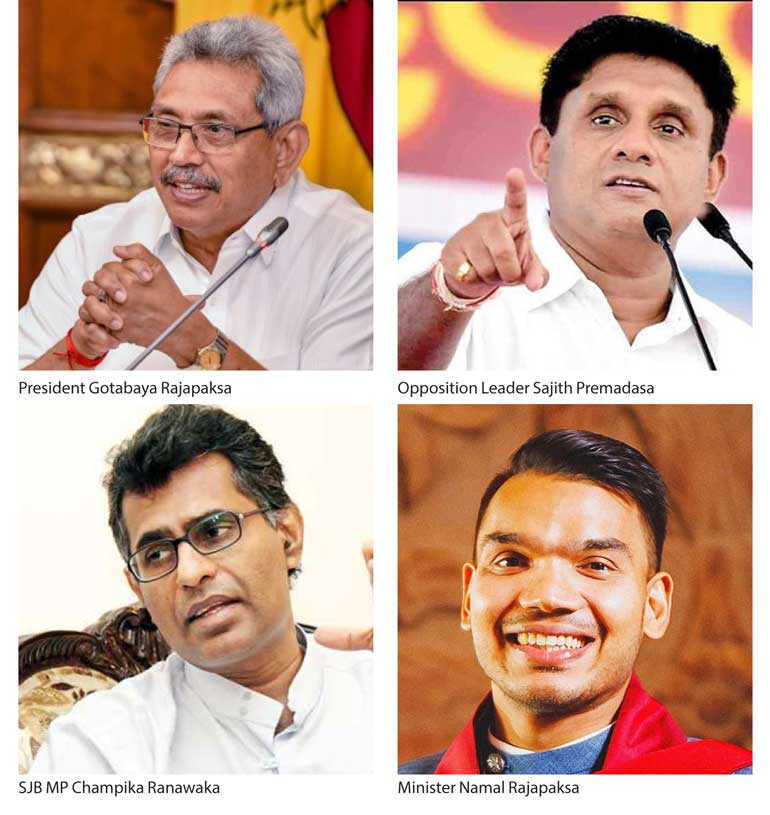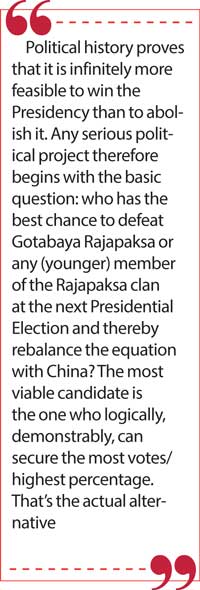Monday Feb 16, 2026
Monday Feb 16, 2026
Thursday, 3 June 2021 00:05 - - {{hitsCtrl.values.hits}}

 The causing of avoidable social suffering through the Gotabaya Government’s Five ‘I’s—irrationality, insensitivity, intransigence, incompetence and inefficiency—is the main but not the only reason we need an alternative in Sri Lanka.
The causing of avoidable social suffering through the Gotabaya Government’s Five ‘I’s—irrationality, insensitivity, intransigence, incompetence and inefficiency—is the main but not the only reason we need an alternative in Sri Lanka.
The second reason is that the present Government has hooked up with one of the two sides of the coming global Cold War, which will be played out in the Indo-Pacific including in the Indian Ocean region.
The Port City is the first artificial island built and in effect owned (for 99 years) by China outside the South China Sea. It cannot but be perceived as a Chinese thrust on South Asia’s southern flank, a year after lethal China-India friction on its northern flank.
Sri Lanka isn’t located in the South China Sea. The Indian Ocean isn’t the South China Sea. Linking up blatantly with China while located in the operational zone of India’s Southern Command, when India is partnered with the USA and member of the Quad, is folly.
The third major reason is the democratic imperative. We have a leader who doesn’t mind his name being coupled with that of Hitler, recognised universally as the epitome of evil in modern history, repeatedly telling President Xi that he wishes to “learn the governance experience of the Communist Party of China”.
It would be perfectly understandable if he wished to learn the economic policy experience of China, but no, it’s the CPC’s ‘governance experience’ that gets him going. That ‘governance experience’ includes the house arrest of Premier Zhao Ziyang who negotiated with the student protestors at Tiananmen Square and reportedly opposed the deployment of the military. Premier Zhao died in 2005 while still under house arrest.
The CPC had its reasons and it not ours to judge, but there is no reason for the elected leader of Sri Lanka which has had an open, competitive multiparty democracy for 90 years, the oldest in Afro-Asia, to inform the leader of China, a one-party-state, that he wishes to learn the ‘governance experience’ of that party.
The retrieval and defence of open civilian democracy, individual freedom and liberty ineluctably require an alternative to this Government.
A fourth reason is that even in the face of growing externalisation of the North-East Question—Geneva, the resolution in the US Congress—there is total absence of a domestic (President-led) political dialogue with the alienated Tamil and Muslim minorities. Even the (mainly Catholic) Christians are disaffected.
UNP and Ranil’s eternal recurrence
Where can the alternative be found? Firstly, where can it not be found? The Port City debate showed there is no manifest dissent within the SLPP-led ruling coalition on policy issues and strategic direction.
The right issues and moments for the SLFP to reassert itself and begin to re-position itself as an intra-regime alternative would have been the Port City Bill and the ban on chemical fertiliser, which spoke to the nationalist and pro-peasant credentials of the SLFP. It was silent on both. If it wakes up someday, it could be an ally of an alternative; not an alternative.
Now for the Oppositional space. I’m a fair student of comparative international politics, and am unaware of any political party anywhere which has made a comeback from two-point-something per cent of the vote and zero elected representatives in the Legislature, to being a contender for power. The baseline is (entering) double-digits.
Let’s not attribute the UNP’s wipe-out to the Easter massacre and the local Fox News-driven Gotabaya Rajapaksa Alt-Right candidacy. N.G.P. Panditharatne was UNP Chairman under J.R. Jayewardene. He was commissioned by the party to identify the reasons for the UNP’s defeats from 1999 to 2004 at both Presidential and Parliamentary Elections.
The Panditharatne Report of 2004 issued after a nationwide conversation with UNP activists identified the most important reason for the party’s electoral defeats: The Party Leader Ranil Wickremesinghe. The report said only 14% of party supporters supported his continuity as Leader. The report was shelved; nothing changed, and hasn’t to this day.
Fourteen years later, in February 2018, both the UNP and the SLFP were defeated at the Local Authorities’ Election by Mahinda Rajapaksa’s newly-formed SLPP. The UNP was dying in the water; its Eternal Leader and his ideology proving fatal.
When given a choice in 2020, the UNP voters went for the new party, the SJB led by Sajith Premadasa, even in Colombo. True, not as many of them voted for the SJB as they did for Sajith at the Presidential Election but that was because he has a more popular profile than the UNP or his party.
The defeat at the Presidential Election had caused a collapse of morale, but at the 2020 Parliamentary Election the UNP voters did not swing back to the UNP under its permanent leadership; they either stayed home or opted for the SJB. This was dramatised in Colombo where the UNP Leader was electorally exterminated by UNP voters.
The UNP lost out to the JVP. It is not the second force nor even the third force. It is the fourth factor, not force. As an alternative, the UNP is electorally dead. The best the UNP could have done is to change its leadership, revamp and become an ally of the younger party which had displaced it. Instead, in a Zombieland version of a new beginning, Ranil Wickremesinghe is re-entering Parliament to represent the UNP through its solitary National List seat.
As for Karu Jayasuriya, he should have been candidate in 1999, 2005 or 2015 but the UNP clung to its Eternal Leader and still does. This past year Karu’s supporters should have fought to wrest the UNP leadership for him, but instead they were sniping at Sajith and the SJB.
Hoping the SJB will rejoin the UNP is like hoping a shark will be swallowed by a sprat.
Procrustean JVP
What of the JVP? It is unknown that a party with 3% of the vote and three seats in Parliament tops 50% and/or a majority of parliamentary seats at the next elections. The JVP had over 10 times as many seats in 2004, a high-water mark which was evidence of the role that the electorate wishes it to play: the leftwing of a patriotic or populist bloc, led by a mainstream personality and party.
The JVP was offered that chance in 1989 when Premadasa became President, and spurned it, with disastrous consequences. It got the chance again with CBK, and took it, but pulled out just as Mahinda was fighting the war and was electorally compacted.
Under Yahapalanaya the JVP was perceived to have propped up a neoliberal Prime Minister, and was shrunk. Clearly, a neoliberal-constitutional reformist bloc is not what the voters want to see it as part of. What will it do under a new, reduced-PR electoral system? To fulfil its potential, it has to go through an intermediate stage of proving itself in a progressive-oriented (Premadasa) government as a coalition partner driving a strong social reform agenda. It can subsequently run for the presidency.
The JVP’s Procrustean politics of pushing for the abolition of the executive presidency is unlikely to have any takers this time around, unless it is a bloc of the UNP, Karu’s caucus and minority politicians who would be unwise to join a formation which the majority of citizens, crying out for change, will not waste a vote on at a Presidential Election. A Presidential Election is a zero-sum game.
From 2% and no elected MP (UNP), or 3% plus three seats (JVP), or non-party (Karu), none can make the jump to 50.01% within one term, even with minority support, however unpopular the incumbent administration.
Universes and formations
There has been a flurry of serious political reflection in the mainstream English-language press. Rajan Hoole, Rajan Philips, Rajiva Wijesinha and Uditha Devapriya come to mind. Devapriya’s profiles of the JVP and Champika Ranawaka are especially incisive.
Rajan Philips recently drew attention to the ideological dominance of two contending constellations: ‘the NGO formation’ and ‘the JC (Jathika Chinthanaya) formation’/‘JC universe’.
It is a valuable insight with an obvious flaw: the absence of the category of Populism. Neither Presidents Premadasa nor Mahinda Rajapaksa, both patriotic-populists, came from nor were dominated by the ‘NGO formation’ or the ‘JC universe/formation’. By contrast, Ranil empowered the former and GR is the latter’s Thanos.
From grotesquely misreading the war/LTTE/Prabhakaran to absurdly regarding MR, a civilian-democrat, and GR, a militarist-autocrat, as on a continuum and only fractionally different, the ‘NGO formation’ got it so wrong, so often, for so long, that the political agency it had the most influence on and in, the UNP, was eliminated by the citizen-voter.
The ‘JC formation/universe’ has been responsible for every centrifugal ethno-religious phobia ranging (at least) from the aftermath of the death of Ven. Soma Thero, the attack on the Shah Rukh Khan show and the Anti-Conversion Bill through to the postwar blocking of provincial devolution and launching anti-Halal agitation. It is the mother of Islamophobia, the father being the Deep State.
 Champika?
Champika?
The JC universe also intersects with the Oppositional space. Another potential alternative floated or pushed in the social media: Patali Champika Ranawaka, a bitter opponent of President Premadasa. PCR’s project is best described as neo-Gotabayaism, i.e., the Viyath Maga-Eliya platform minus the Rajapaksas. Much more flatteringly it can be described as neo-Modi-ism: unfettered capitalism with an ethno-religious majoritarian hegemonic agenda.
Ranawaka is unlikely to secure Muslim, Tamil and Christian votes especially when the pro-Rajapaksa media dredge out footage of all his old speeches from the aftermath of the death of Ven. Soma Thero, through the Anti-Conversion Bill to the anti-Halal campaign and the BBS kick-off rally in Maharagama. He has since shifted from RSS/Shiv Sena to BJP; from JDL/Gush Emunim to Likud so to speak.
The Mangala Samaraweera 2015 strategy based on a majority of the minorities plus a minority of the majority is no longer viable given the seismic Sinhala shift which it triggered, but it would be folly to risk a candidacy that has a hardline majoritarian-hegemonistic anti-minority history. How viable would Benny Naftali be if Israel didn’t have apartheid aspects (confirmed by South Africa’s President Ramaphosa in a recent France 24 interview) and all Palestinians in the Occupied Territories were enfranchised?
Sajith’s SJB
The ‘NGO formation’ almost lost the war; the ‘JC formation’, the peace. The dual failure of the ‘NGO formation’ and the ‘JC formation/universe’ makes it imperative and feasible to interpose a new, progressive-centrist ‘universe/formation’.
Premadasa’s SJB has the greatest potential and most proximate positioning to be that formation. However, whether or not the virus of Ranilist discourse can infiltrate the SJB and subvert it, will decide its fate. Three-fourths of the Sinhalese who are three-fourths of the citizenry, shifted ideologically in 2019-2020. Though the Sinhala voters will swing decidedly away from the Government electorally and to some extent ideologically, they won’t recoil all the way back from strong-State nationalism to constitutional neoliberalism 2015-2019. The alternative must recapture the centre.
A purely empirical analysis points clearly to what the actually existing alternative is, however drastically that alternative needs improvement. Sajith Premadasa scored 42% in November 2019 when the Rajapaksas were at their peak. That’s 10% less than Gotabaya and 8% less than the 50.01% needed to win. Anyone who did that creditably at the worst of times is logically the alternative in any realist analysis. The same goes for the SJB which scored more seats and a higher percentage than the SLFP at the 1952 election under S.W.R.D. Bandaranaike on his first time out after founding the SLFP in 1951.
That, frankly, is the case for Sajith and the SJB by process of logical elimination. However, I shall go on to argue that Sajith’s SJB is the alternative not only by a quantitative but also a qualitative reckoning.
Today, especially but not only in the Global South, it has proved almost impossible to defend liberal-democracy without populism, the market economy without social democracy, the centre without a left orientation; impossible to defeat ethno-religious majoritarianism without socioeconomic majoritarianism, and ultranationalism without moderate nationalism/patriotism. Sajith and the SJB have what it takes.
Sajith Premadasa has three unsurpassable comparative advantages. Firstly, his cluster of qualities: relative youth, good education here and overseas, familiarity with the world having lived and studied in the West, sensitivity to grassroots social issues and national sentiment, concern for the people and chemistry with the crowds. He also has two decades experience of battling the Rajapaksas in the Deep South.
Secondly, he bears the ‘national-popular’ Premadasa brand, thanks to the successful development model that President Premadasa implemented. The late Neville Jayaweera, who held a First-Class Honours degree in Philosophy from Peradeniya (1953) and was one of the most stellar products of the elite Ceylon Civil Service, nailed it:
“…The soaring vision he [Premadasa] had for his country, and I do not mean merely for the Sinhala people but for Sri Lanka as a nation, was unmatched by any political leader of the last century, either conceptually, or in terms of the intelligence and managerial energy with which he backed it up, even though that vision was tainted by his many failings…” (http://archives.sundayobserver.lk/2009/01/11/fea15.asp)
Thirdly, the Ronnie de Mel endorsement. Nobody knows or cares more about the economy than the architect of Sri Lanka’s Open Economy and our brainiest Finance Minister ever. The unambiguous endorsement by De Mel, came on his 96th birthday, saying (on camera) to Sajith Premadasa:
“I have observed you closely since your return…I think that the only hope for Sri Lanka to make a comeback is if you can get the whole thing going under your control and the control of policies that you represent. That’s the only hope for Sri Lanka…Sri Lanka is in a dire situation…I am very fearful at times at what might happen…I hope you will be able to save Sri Lanka…I always feel that you are the only hope…”
Political strategy
The centre of gravity of the system isn’t the Parliament. An impeachment won’t fly because the Rajapaksas will stand together while the Chinese factor will be the material incentive preventing the necessary numbers of dissenters/defectors.
The centre of gravity lies in the Presidency. It is the nexus and node of the Rajapaksa clan-China interface. Currently the Presidency is the centre of gravity twice over—politically and strategically—because the present incumbent, President Gotabaya Rajapaksa, is the closest Sri Lankan comrade-in-arms of President Xi, while GR’s power-base, the military/ex-military brass, is the natural ally of the PLA (some are alumni of Chinese military academies).
Political history proves that it is infinitely more feasible to win the Presidency than to abolish it. Any serious political project therefore begins with the basic question: who has the best chance to defeat Gotabaya Rajapaksa or any (younger) member of the Rajapaksa clan at the next Presidential Election and thereby rebalance the equation with China? The most viable candidate is the one who logically, demonstrably, can secure the most votes/highest percentage. That’s the actual alternative.